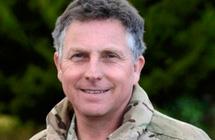
2 minute read
General Sir Nicholas P atrick Carter
Commander Land Forces in November 2013 and was appointed Chief of the General Staff in September 2014.
General Sir Nicholas Carter commissioned into The Royal Green Jackets in 1978. At Regimental Duty he has served in Northern Ireland, Cyprus, Germany, Bosnia and Kosovo and commanded 2nd Battalion, The Royal Green Jackets, from 1998 to 2000.
Advertisement
He attended Army Staff College, the Higher Command and Staff Course and the Royal College of Defence Studies. At staff he has been Military Assistant to the Assistant Chief of the General Staff, Colonel Army Personnel Strategy, spent a year at HQ Land Command writing the Collective Training Study, and was Director of Army Resources and Plans. He also served as Director of Plans within the US-led Combined Joint Task Force 180 in Afghanistan and spent three months in the Cross Government Iraq Planning Unit prior to the invasion of Iraq in 2003.
General Carter commanded 20th Armoured Brigade in Iraq in 2004 and 6th Division in Afghanistan in 2009/10. He was then the Director General Land Warfare before becoming the Army 2020 Team Leader. He served as DCOM ISAF from October 2012 to August 2013, became
Chief of the General Staff The Chief of the General Staff (CGS) is the professional head of the Army, with responsibility for developing and generating military capability from an integrated Army (Regular and Reserve) and for maintaining the fi ghting effectiveness, effi ciency and morale of the Service.
The CGS reports to the Chief of the Defence Staff (CDS) and, as a Service COS, has a right of direct access to the Secretary of State and the Prime Minister. The CGS is a member of the Defence Council and the Army Board, the Armed Forces Committee, the Chiefs of Staff Committee and the Senior Appointments Committee.
Responsibilities The Chief of the General Staff: • maintains the institutional health of the Army by exercising Full Command responsibility for all Army personnel • ensures the effi cient and effective governance of the service • chairs the Executive Committee of the Army Board and the Army Command Group • contributes to the conduct of defence higher level business, with a particular responsibility for providing specialist advice on Army matters • develops future Army capability within the context of Defence strategic direction and resource allocation • leads the senior management team of the British Army
hƩ ps://www.gov.uk/government/people/
www.rifl espropertyservices.co.uk












